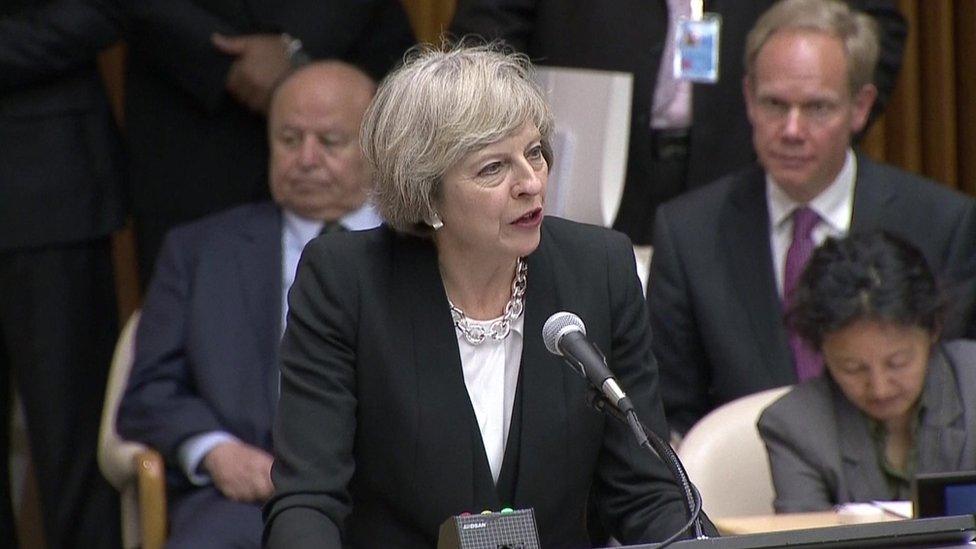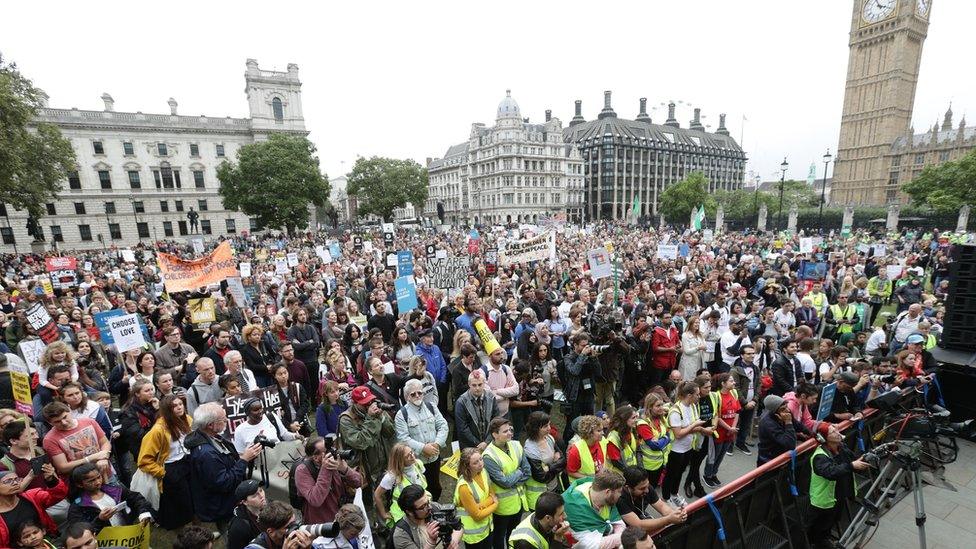Theresa May urges global measures to tackle 'uncontrolled migration'
- Published
- comments
Campaigners have put hundreds of life jackets on display in Parliament Square
Theresa May has called for a global clampdown on "uncontrolled migration", saying it is the right and the duty of countries to control their borders.
At the UN summit in New York, the prime minister said the migration crisis had been "exacerbated" by "unprecedented" numbers of economic migrants.
She urged a change in approach, saying refugees should claim asylum in the first safe country they reach.
The UN says a record number of people have been displaced by conflict.
It estimates that 65.3 million people were either refugees, asylum seekers or internally displaced at the end of 2015, an increase of five million in a year.
The UN summit for refugees and migrants is aiming to agree a "more humane and coordinated approach".
Addressing world leaders, Mrs May called for a greater distinction between refugees and people trying to enter a country for economic reasons.
"Controlled legal and safe migration" benefited the economy, she said, and there was nothing wrong with "moving for a better life".

The prime minister said the international community had to "come together" to deal with the migration crisis
But she said the current levels of "uncontrolled migration" were not in the interests of the migrants or the countries involved, and served to reduce popular support for refugees.
"We need to be clear that all countries have the right to control their borders and protect their citizens and be equally clear that countries have a duty to manage their borders, to reduce onward flows of illegal and uncontrolled migration," she said.

Protesters held a "Refugees Welcome" march in Parliament Square ahead of the summit
She argued that refugees should seek asylum in the first safe country they arrived in because the current trend of onward movement exposed them to increased danger and benefited criminal gangs.
Such an approach would bar EU countries from allowing migrants to travel onwards from countries like Greece, Italy and France through Europe to Britain.
'Root causes'
Mrs May said resources should be focused on "refugees in desperate need of protection", and she urged the international community to "come together" to deal with the crisis.
UN appeals for assistance were "underfunded", host countries were not getting enough support and displaced people not receiving the aid they needed, she said.
The PM said the UK was "already playing its part" but promised to "step up our efforts" with more financial assistance.
Defending the UK's approach, the Home Office said the government had pledged £2.3bn in humanitarian aid to Syria and neighbouring countries and was providing nearly £70m in response to the Mediterranean migration crisis.
"This government has been at the forefront of the international response to the humanitarian crisis in Syria," it said.
"We have committed to resettling 20,000 Syrian refugees through our Vulnerable Persons Resettlement scheme over the course of this Parliament - we are on track to achieve that and have already provided refuge to more than 2,800 under this route.
"Under the new Vulnerable Children's Resettlement Scheme we will also bring 3,000 individuals to the UK over the same period."
'Political will'
As well as speaking at the UN event, chaired by secretary-general Ban Ki-moon, Mrs May is also taking part in a summit on refugees hosted by US president Barack Obama on Tuesday.
In London's Parliament Square, campaigners have created a display using lifejackets worn by refugees crossing the sea into Europe.
Charities behind the temporary installation said it would "remind leaders of the risks families have taken to reach safety, the need for solidarity with refugees, respect of their rights and more international responsibility sharing".
They said the summit was a "historic opportunity to garner the political will of world leaders to save lives, protect rights and share responsibility on a global scale".
Labour MP Yvette Cooper, who chairs her party's refugees taskforce, said the UK was "resisting doing our bit" in terms of settling refugees, particularly children.
She agreed with Mrs May on the importance of border controls, which she said would help prevent people-smuggling, but criticised the PM for focusing on this element rather than helping refugees.